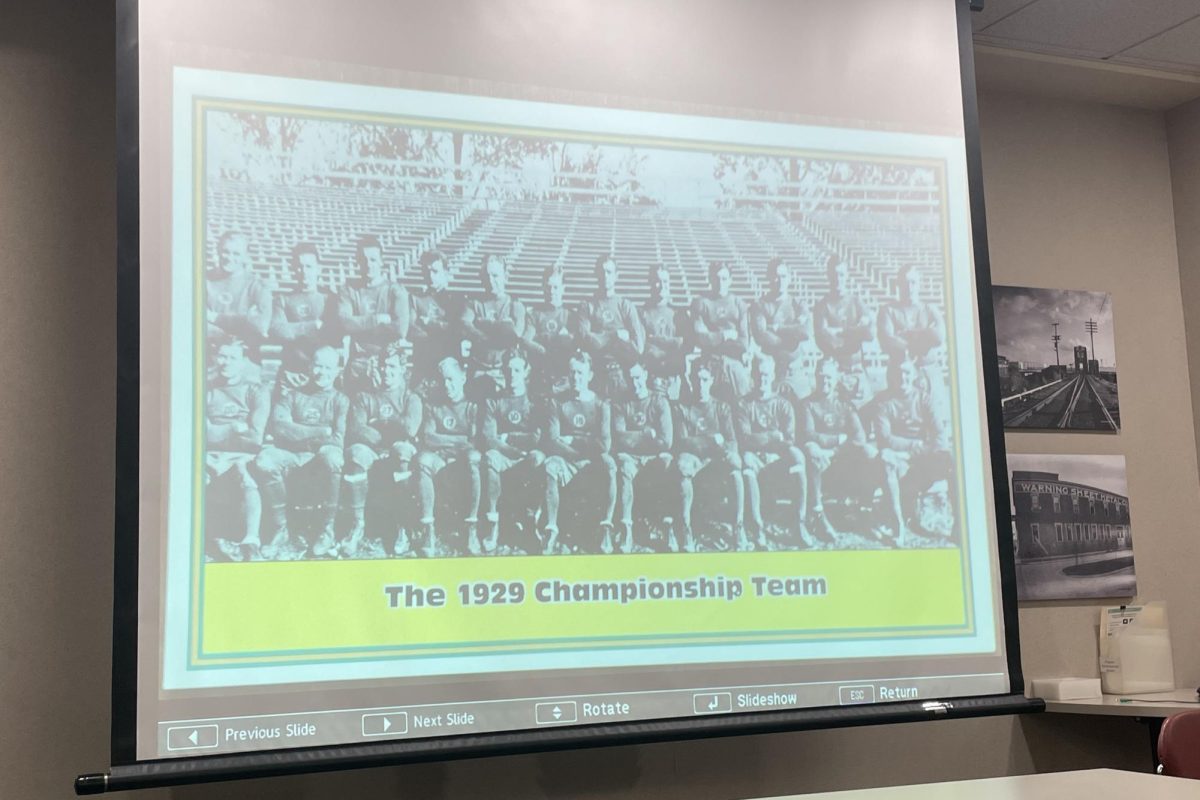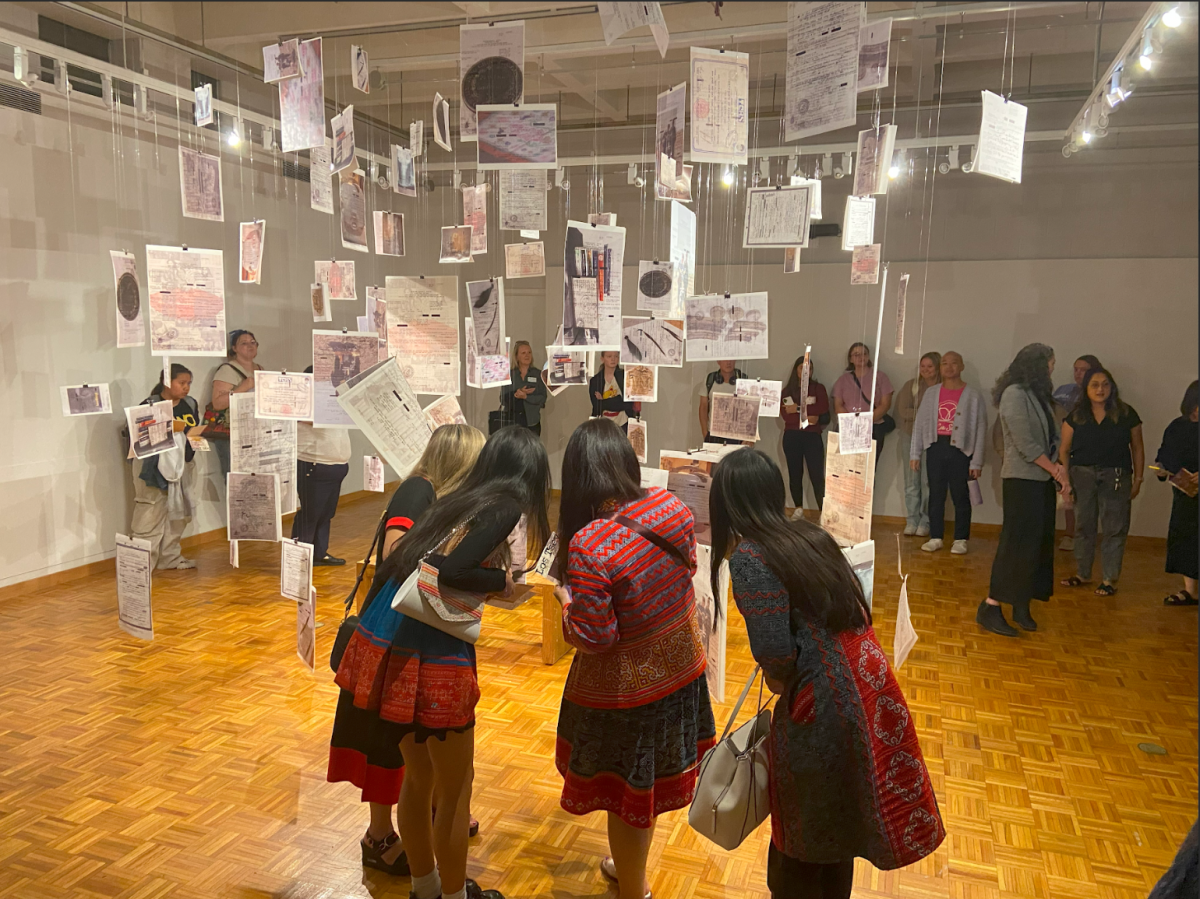

In fall 2013, Oshkosh Student Association Vice President Graham Sparks was a first-time OSA senator and was preparing to drive four hours to UW-River Falls with then OSA Vice President and current President Jordan Schettle for a UW System Student Representatives meeting.
Initially intimidated by Schettle’s professional and mature demeanor, Sparks said he was concerned about what he and Schettle were going to talk about for such a long drive. As he put his bags into Schettle’s car, he recognized a trap song, a cross between house and electronic dance music, Schettle was playing.
Their mutual love of trap music, something Sparks said people would be surprised to learn Schettle likes, showed Sparks a different side of Schettle and broke the ice.
Schettle speaks with authority and eloquence, “likes” and “ums” rarely slipping into his speech. Every day he carries himself seriously and professionally in either a full suit or a dress shirt and tie.
Sparks describes Schettle as a thoughtful, methodical and intellectual person who asks great questions.
“He takes his time with his decisions, which is something that is really hard to find in someone our age because we always act on emotion,” Sparks said.
When talking to Schettle about matters of business, it is hard to decipher how he is feeling. It is his ability to listen without immediate judgment that impresses OSA office manager Rae Ann Wetzel the most about him as president.
“He’ll sit there with a poker face,” Wetzel said. “You do not know what Jordan is thinking until after the meeting.”
Sparks said Schettle brings a rare sense of professionalism to the presidential position and to student government.
“Sometimes people can take the title too far, selfishly,” Sparks said. “They put it on their résumé and forget about it whereas Jordan embodies what it is to be a president through his actions, not even in Senate, but when nobody’s watching.”
However, there is a relatable, laid-back, Star Wars and Harry Potter-loving side of Schettle many students may not see. He will say something sarcastic, looking someone straight in the eye completely serious, but if he or she waits long enough, Schettle will break into a huge smile.
“He is a person,” Sparks said. “He is a student like all of us, and he’s just as worried about the unknown as everybody else. He has a plan, but we’re all in this together as students. He’s just another student; he’s just doing it a different way.”
After serving his sophomore year as OSA vice president, Schettle said he decided to run for president because he thought Oshkosh students needed a strong leader who could handle the many impending changes the University would be facing.
“I wanted the students to have a leader who had connections at the University and at the state level, but also someone who wasn’t afraid to initiate new policies that were actually better for them and could look long term,” Schettle said. “In the past we have had so many OSA presidents who like to jump from fire to fire, and I was sick of that happening.”
As president, Schettle represents all 14,000 UW Oshkosh students, creates policies, advises Chancellor Leavitt on student issues and represents Oshkosh at UW System Student Representatives.
Wetzel said Schettle differs from past presidents because he works cooperatively with the administration instead of viewing the administration as against the students.
“[Former presidents] were more out to attack administration,” Wetzel said. “Jordan sits down and talks with them maturely and gets what OSA and the students need.”
Schettle said past presidents focused too much on retaining power to create their own legacy.
“When that happens, you remove people from the table of discussion, and you put your friends there,” Schettle said. “You put people whom you know will support you.”
OSA became a bubble, according to Schettle, causing the student body to not only be uninformed about OSA’s actions but even what OSA itself is. Reversing this problem by increasing awareness and participation has been one of Schettle’s greatest challenges.
To inform students about OSA, Schettle said OSA budgeted $6,000 for marketing efforts, reached out to news media, and appointed 10 new senators from a variety of majors.
Schettle said he needs to personally communicate with the student body, hopefully getting them interested in the issues facing Oshkosh.
“I make sure the Senate and the Assembly are well-involved in the processes and the decisions that I make, but when you think about it, we’re not reaching all 14,000 students, and all 14,000 students deserve to be informed,” Schettle said.
If students want influence in OSA decisions or want a voice on campus, Schettle encourages them to join OSA or to use OSA’s resources to connect students directly to the people with whom they have an issue.
“Sometimes it is called taking a stance yourself and standing up for what you believe in and actually speaking to individuals instead of just complaining about it in your dorm room or on Facebook,” Schettle said.
Schettle said he will always make time in between a hectic school, work and social life to listen to students, made possible by cutting things that were once important like playing video games and adding a lot of 5-hour Energies.
“I don’t necessarily sleep, so there’s been meetings that I’ve had at 11:30 p.m.,” Schettle said. “That’s fine with me because I’m here to help the students.”
His devotion is shared by the many other OSA members who are invested in improving students’ experience at Oshkosh, according to Schettle.
“It’s not just me,” Schettle said. “There’s a multitude of competent and passionate individuals who help me look successful to other students, but in reality I owe all of my successes to them.”
Two things that most characterize Schettle are his delegation and holding people accountable, according to Wetzel.
“If he does see that you are not following through with the duties that you say you are going to do, he will reassign that to himself or someone else,” Wetzel said.
Ever since Schettle was young, he has been a leader who likes to delegate, Schettle’s mother Mary Flowers said. When Schettle was 11, Flowers sent him to a babysitting class for his newborn sister from which came back correcting Flowers on her parenting.
“I said, ‘Jordan, I’m going to correct you right now. I didn’t kill you, so I don’t think I’m going to kill her,” Flowers said. “[Schettle] said, ‘I just wanted to let you know what you were all doing wrong.’”
Schettle expects the same hard work and high standards of himself that he does of others, according to Flowers, who tried to instill in Schettle that working hard is how to get ahead in life.
“I think he believes that philosophy,” Flowers said. “He wasn’t always happy about it, but he did like earning money and buying his own things.”
Sparks said it is important that students know how hard Schettle works—harder than anyone Sparks knows.
“His ego has completely left the door, and it’s all about getting it done,” Sparks said. “I think that’s going to be his legacy. He has no ego. He just wants to get things done for the students.”
Accomplishing things and working toward a compromise with opposing decision makers can be strenuous, Schettle said, because everyone in politics has an ego.
“It’s very difficult in trying to work with those egos sometimes, but you have to bite the bullet and think of the bigger picture and help the students that aren’t always talking in your ear telling you what they want,” Schettle said.
Despite his achievements at Oshkosh, Schettle said he doesn’t feel like he has been successful because he hasn’t satisfied every student at the University.
“That’s not something that will probably ever happen, but it gives me a goal to continue working every day,” Schettle said. “It gives me pleasure in the sense that I’m working toward trying to make everyone as happy as possible.”








